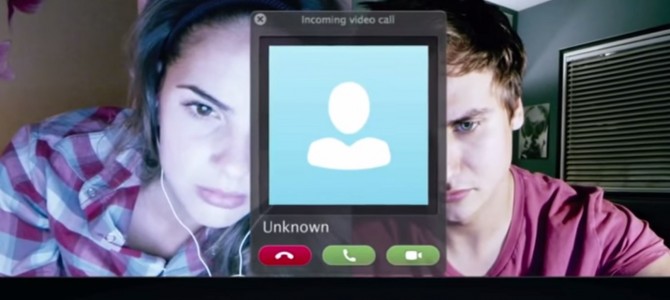My brother Luke and I recently attended a viewing of the horror movie “Unfriended,” a film that premiered last year but for some reason only found its way to a wider release this month. Neither of us are particularly vested in the horror movie genre, but the film seemed both interesting and original enough to merit a look.
The movie takes place entirely on a computer screen, with most of the action occurring on the Skype video feeds of six friends. Real-time Google searches, Facebook messages, and other websites add to the action.
A Gruesome Way to Be Unfriended
The six friends are meeting online to chat on the anniversary of another girl’s death; the girl killed herself a year before after being mercilessly bullied online due to a humiliating video posted on YouTube. Soon enough, a mystery user joins the chat, claiming to be the dead girl; as it turns out, each one of these young folks had something to do with the dead girl’s suicide the previous year. The alleged dead girl begins playing sick games with and threatening them, and in short order they begin dying in gruesome and shocking ways.
That’s mostly all there is to the hour and 20 minutes this film comprises. The film suffers from the standard horror movie defects: the deaths are often comical and over-the-top (one character meets his gory end by way of a kitchen blender, of all things), while the jump-out-at-you scares are sometimes cheap and predictable.
And as an ethics seminar the whole thing stinks: I think we are meant to see the victims as loutish idiots and archetypal cyberbullies, and thus we’re supposed to relish the payback they receive at the hands of the dead girl—but honestly, the agony and the suffering they endure is simply too awful to justify, and we just end up feeling sorry for them instead. Due to her cruel and vicious revenge tactics, the dead girl herself comes off as a petty, hateful character, unlikeable and mean. The torture these young folks endure proves once again that it’s best to just let God deal with revenge.
Feel Smarter, Punk? Do Ya?
In the end, however, the film is interesting and rather fun, particularly the novel way in which it’s presented. Oddly enough, the film’s Internet-based backdrop provides its greatest lesson. Recently we learned that, for many people, a quick Internet search makes you feel smarter even if you don’t really know a lot about a given topic. For lots of folks, the Internet has become an easy kind of cheat-sheet where one can quickly solve a problem with superficial knowledge-gathering instead of actually taking the time to learn anything.
In the height of their desperation, the victims in “Unfriended” take a similar approach, turning to the Internet to bail them out of their predicament—and the Internet fails them, time and again. The main protagonist frequently visits a website that gives advice on what to do if a dead person messages you on the Internet; to solve the problem, the website advises you to “confess your sins” to the dead person. The protagonist inexplicably ignores this advice, possibly because in her anxiety she simply did not notice it. We see this all the time in the hasty, slapdash research culture of Internet arguments, in which a person will quickly scan an article, essay, or academic abstract and completely miss a crucial bit of information contained therein.
Later, the beleaguered protagonist turns to Chatroulette to call for help. This, too, is unsuccessful. The characters even desperately search a list of police radio codes at one point so they can decode an overheard police announcement. This ends up being useless knowledge that helps them with nothing. Numerous times, the victims turn to the Internet for cheap Internet-style redemption from their ghostly assailant, and the Internet never delivers. Blenders roll. People die.
So if “Unfriended” teaches us anything (other than the feasibility of homicide-by-blender), it’s that the Internet has limitations, as far as problem-solving is concerned. We must not rely on its shallow siren call in place of real learning; we must avoid depending on cheap search-engine scholarship, for it will not help us in our hour of need.
I guess the film also teaches us that it’s bad to cyberbully, as well. But honestly, did you need to see “Unfriended” to know that?









